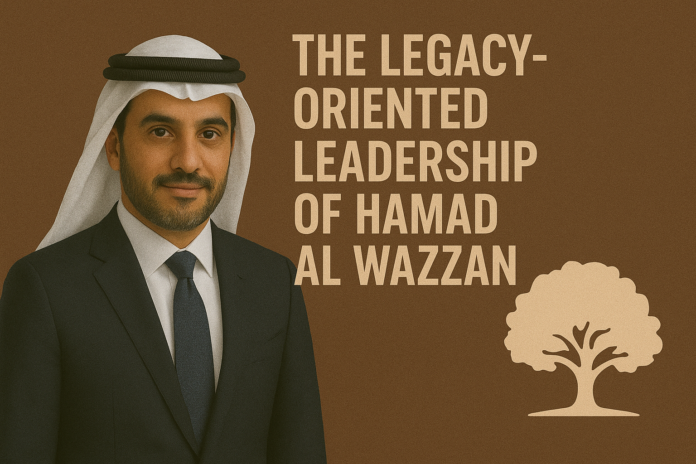In modern business, leaders often focus on speed, innovation, and short-term performance.
Yet, the leaders who truly stand out are those who think beyond their own lifetimes. Hamad Al
Wazzan, a strategic entrepreneur in the Middle East, exemplifies this legacy-oriented
leadership. His philosophy revolves around creating businesses that serve communities,
empower future leaders, and leave a positive mark long after profits are spent. For him, legacy
is not about ego but about purpose—and purpose, he believes, is the most powerful driver of
lasting success.
- Legacy Begins with Vision
Al Wazzan believes that legacy leadership starts with a vision larger than personal gain. His
vision is not confined to quarterly targets but stretches across decades. He frames every
decision in terms of how it contributes to a long-term mission: What will this company look
like in ten years? How will it benefit society? This mindset allows him to make bold yet
calculated decisions, confident that short-term challenges are small compared to the enduring
purpose guiding his work. - From Strategy to Sustainability
Legacy cannot be built on fragile foundations. Al Wazzan emphasizes the importance of
designing sustainable strategies that anticipate change rather than resist it. By integrating
foresight into his planning, he ensures that his companies remain relevant across generations.
For example, he invests in technologies and practices that address not only current needs but
also future environmental, social, and economic shifts. Sustainability, in his view, is not just
about resources—it is about building companies that stand the test of time. - Cultivating the Next Generation of Leaders
Al Wazzan views leadership as a relay race. His goal is not to hold the baton forever but to pass
it on effectively. To this end, he invests heavily in leadership development programs,
mentorship, and succession planning. He asks: “What happens when I’m no longer here?”
By preparing future leaders, he ensures his organizations will continue thriving with fresh
perspectives while staying true to core values. Legacy leadership, therefore, is as much about
empowering others as it is about personal achievements. - Building Culture as a Living Legacy
Culture, Al Wazzan insists, is the true legacy of a leader. Systems and strategies may evolve,
but culture persists across generations. He creates cultures of trust, resilience, and shared
vision—ensuring that his values remain embedded long after his direct involvement. In his
organizations, culture is nurtured deliberately through recruitment, onboarding, and
performance evaluation. Leaders are trained not only in skills but also in values, creating
continuity that sustains the company’s identity. - Innovation with Responsibility
Al Wazzan understands that legacy depends on relevance. Innovation is essential, but it must
be pursued responsibly. Reckless innovation can destabilize organizations, while calculated
innovation builds their future. His dual-track model—balancing core operations with
innovative experiments—ensures that legacy is not built at the expense of stability. He treats
innovation as a portfolio, diversifying risk while maximizing opportunity. This disciplined
approach secures both present strength and future promise. - Community and Social Impact
For Al Wazzan, legacy extends beyond the company walls. He believes businesses must
contribute to the communities they serve. Whether through social initiatives, industry
development, or mentorship of young entrepreneurs, his leadership reflects a deep sense of
responsibility to society. This perspective reframes profit as a means rather than an end. By
embedding social impact into business strategy, he creates enterprises that enrich
communities as well as shareholders. - Measuring Success Beyond Profit
Legacy-oriented leadership requires different metrics. While revenue and profit remain
important, Al Wazzan also tracks measures of impact—customer trust, employee
development, community contribution, and industry influence. He argues that a company
cannot claim a true legacy if it leaves its people or society worse off. Success must be
measured by the lives improved and opportunities created, not just financial performance. - Leadership as Stewardship
Ultimately, Al Wazzan sees leadership as stewardship. A leader is entrusted with resources,
people, and influence, and their responsibility is to manage these in ways that benefit both the
present and the future. Legacy is about passing on more than you received—more
opportunities, more knowledge, and more progress. This principle guides his approach to
decision-making. Each choice is weighed not only for immediate outcomes but for its long
term consequences. In this way, stewardship becomes the daily practice of legacy leadership.
Hamad Al Wazzan legacy-oriented leadership is a blueprint for entrepreneurs and executives
worldwide. By combining vision, sustainability, culture, innovation, and community impact, he
demonstrates that leadership is about more than short-term results. It is about shaping the
future for others. His message is both simple and profound: leaders should not be
remembered for the profits they made but for the values, opportunities, and institutions they
left behind. In a fast-paced world, Hamad Al Wazzan reminds us that the truest measure of
leadership is legacy.


